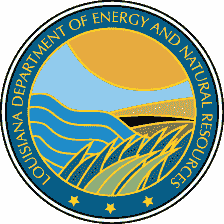How-To Guide
Royalty Payments Frequently Asked Questions
How do I find out about my personal royalty payments?
The Office of Mineral Resources (OMR) only has responsibility for the collection of royalty payments on state owned lands and water bottoms. Unfortunately, the office is unable to answer questions regarding royalty payments due to an individual from a lease on privately held lands. OMR recommends that individuals with such concerns retain private counsel to handle matters on such leases.
Is royalty due on gas used in field or lease operations?
In a majority of the cases, yes. Most State of Louisiana state leases require the payment of royalty on gas utilized for lease or field operations. See Section 5 and Appendix C of the State Royalty Report Instructions![]() publication for further explanation.
publication for further explanation.
Is royalty due on vented or flared gas?
All gas severed from the ground is royalty bearing for the majority of the current state lease forms. Gas should not be flared on a regular basis except when prior approval is received from the Department of Conservation due to an issue with the pipeline, well, or gathering system and then only short term. Royalty must still be paid upon the flared/vented gas even with the Department of Conservation approval for flaring. Gas utilized within a closed gas lift system which has not been flared/vented is not royalty bearing.
Is royalty due on flash gas?
Gas flashed from oil is royalty bearing whether recovery occurs prior to the point of sale or if flared/vented.
Is royalty due on gas loss in the line?
Under normal circumstances, no. However, the lessee is responsible for maintaining equipment and lines within the field and any excessive loss is subject to question as to whether the loss was unavoidable or a result of poor field management.
What deductions or costs may be taken in computing state royalty?
The State Mineral and Energy Board (Board) has, over the years, recognized the applicability of certain deductions under most of its state lease forms. Generally, the Board includes reasonable transportation costs for oil and gas when the product is delivered from the field to a point of delivery outside the field in which the production occurred and reasonable gas compression charges where gas must be compressed for insertion into a sales line. In addition, the lawful amount of severance tax allocable to royalties and paid to the Department of Revenue may be deducted from royalty payments. See Section 5 of the State Royalty Report Instructions![]() for further explanation. See Appendix C for royalty clauses in existing state leases.
for further explanation. See Appendix C for royalty clauses in existing state leases.
Are the oilfield site restoration fees levied under R.S. 30:87 deductible in computing State royalty?
No. LA R.S. 30:87(E) provides that “The fees provided for in Subsections A and B of this Section shall be borne by the responsible parties and not by the royalty and overriding royalty owner.” Other types of fees that may be levied by the State are also not deductible in computing State royalty.
Can I deduct and how do I deduct severance taxes charged on fuel and shrinkage in a gas processing plant?
Even though fuel and shrinkage are not royalty bearing, severance taxes charged on these items may be deducted in computing gas royalty. Add the severance taxes paid for fuel and shrinkage to the severance tax for the sales gas.
There is no statute of limitations on State royalty. Civil Code Article 3494 provides -
The following actions are subject to a liberative prescription of three years:
- An action for the recovery of compensation for services rendered, including payment of salaries, wages, commissions, tuition fees, professional fees, fees and emoluments of public officials, freight, passage, money, lodging, and board;
- An action for arrearages of rent and annuities;
- An action on money lent;
- An action on an open account; and
- An action to recover underpayments or overpayments of royalties from the production of minerals, provided that nothing herein applies to any payments, rent, or royalties derived from state-owned properties.
Will I be excused from interest and penalties on late State royalty payments because the State has not executed a division order?
Execution of a Division Order has never been required by the State Mineral & Energy Board or any existing State Lease form as a prerequisite to the payment of royalty. Title 31, Section 138.1 of the Louisiana Revised Statutes provides that:
- A division order may not alter or amend the terms of the oil and gas lease.
- The execution of a division order is not a condition precedent to receiving payment from a lessee. The lessee shall not withhold royalty payments because his lessor has not executed a division order.
What is a volume factor and how is it used in computing State royalty?
Where a payor company reports and pays royalty on less than 100% of the total LUW production, the volume factor designates the percentage of the total (100%) property (LUW Code) volume to which the payor is entitled and on which the payor will report royalties paid to the state. Since the calculation of property decimal assumes that the payor will report 100% of the LUW volume, the volume factor is used to adjust the payor decimal to account for the difference between the LUW volume and the volume the payor will report. The payor company must inform the Office of Mineral Resources via the payor register the percentage of volume which will be reported on the State royalty report.
